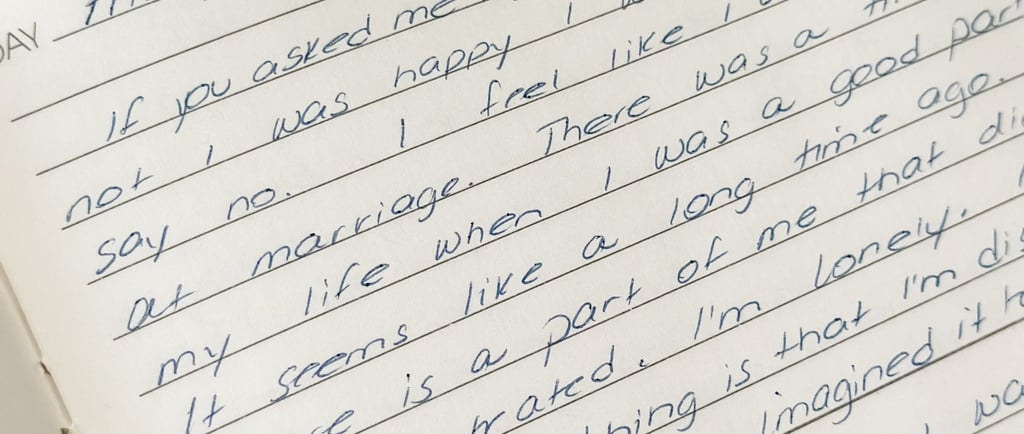Closure Is a Skill (And I Sucked at It)
Ghosting is easy. Honorable closure takes guts.
Renee Wood


The first time I ever wrote about being unhappy in my marriage, I’d been in it for 18 days.
And yet I held onto it for 32 years.
I did the same thing with my candy apple red Dodge caravan. Rust started eating away at it, but I drove it another 4 years until the bottom literally fell out.
Let’s not get started on the pair of hermit crabs I got when I was 12 and kept them until their exoskeletons hung like noodles out of their shells.
Closure has never been my strong suit.
I’ve been a white-knuckle gripping kind of gal.
But in this gentle era of my life, I want to practice letting go faster and do it with less guilt and more grace.
“We must talk about this problem of yours. There is a beautiful creature hidden down beneath the hole you have dug for yourself.” – Hafiz
🌿 Finding a Better Way to End Things
Linda Carroll Curtis calls it Honorable Closure.
It’s a framework for ending things — relationships, roles, identities — with intention and integrity.
Not with drama.
Not with avoidance.
Not with silence masquerading as strength.
It’s about leaving clean.
It’s about looking backward without fixating.
It’s about moving forward by unhitching your emotional U-Haul.
🌿 What Makes Closure Honorable
Honorable closure means:
Telling the old story in a new way.
Instead of recycling pain or pretending you’re “fine,” you give voice to the truth of what happened — and then be on the lookout for what’s working now. This helps you honor the lessons without staying stuck in the hurt.Resolving your regrets.
It’s not about shame or endless self-blame. It’s about courageously owning your part, seeing where you could have shown up differently, and turning those insights into growth.Letting go and letting it be.
Notice what you're still holding onto—resentments, expectations, or grudges. Remember that forgiveness isn't about the other person; it's more badass than that.Being intentional about how you end things instead of ghosting, avoiding, or letting resentment fester.
Linda emphasizes that people often stay too long in the wrong situation (a job, a relationship, a project) because they don’t know how to leave well — or they fear the unknown.
Honorable closure provides a framework for moving on in a way that’s emotionally clean, not messy or ambiguous.
There is no reason not to follow your heart. … Stay hungry. Stay foolish.” – Steve Jobs
🌿Creating Your Honorable Closure Statement
She encourages writing a “closure statement” — not always shared with others — that:
Names your reasons with honesty
(This is why I’m choosing to step away…)Acknowledges your part and growth
(Here’s what I’ve learned, how I’ve changed…)Offers gratitude where possible
(I’m thankful for what this gave me, even if it was painful.)Releases resentment or emotional clutter
(I choose to let go of blame, even if I’m not ready to forgive.)
💡Why This matters:
It clears emotional residue and stops the recycling of guilt, blame, or regret.
It respects the past without staying tethered to it.
It models emotional integrity and maturity, especially for those of us committed to growth.
Gentle Nudge
Closure takes practice. Most of us weren’t taught how to leave well — only how to try harder.
Linda’s work gives us a map out of the trying trap.
Maybe you’re stuck in a job you hate.
Or a friendship you’ve quietly outgrown.
Or a marriage where your spouse has never truly known what keeps you up at night…
This could be your cue for closure.
To leave — not with rage or regret…
But with reverence.
Not in pieces…
But on purpose.
✍️ Honorable Closure Statement
1. What I'm Leaving: "I am choosing to step away from _______." Name the relationship/role/situation clearly and without judgment.
2. Why I'm Leaving: "I've grown to understand that this is no longer aligned with who I am becoming." Add a simple explanation — be honest but not blaming. This isn't about fault—it's about fit.
3. What I'm Taking with Me: "I'm grateful for _______." List some moments, lessons, or insights. I'm choosing to honor what was good — the growth, the learning, and the unexpected gifts I didn't see at the time but now carry with me.
4. What I'm Leaving Behind: "I release both myself and others from carrying _______." Name what you're setting down—resentments, expectations, old stories. Not because the regret, the "what ifs" don't matter, but because I want to be free.
5. My Intention Moving Forward: "I move forward with _______." Clarity, integrity, and openness. I trust that this ending is making space for something new and necessary.
"You can only see as far as your headlights, but you can make the whole trip that way."
— E.L. Doctorow
Often all we need is enough light for the next step:
The clarity to name what we're leaving
The courage to say why
The wisdom to collect what matters
The freedom to release what doesn't
🕯️ What are you still holding onto… that you might finally be ready to give an honorable closure to?
Follow us
info@gentlenudges.com
© 2025. All rights reserved.
CONTACT us
